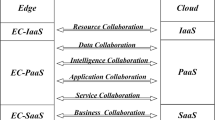Abstract
Federated learning has emerged as a promising approach for collaborative machine learning while preserving data privacy in distributed settings. Despite recent advancements, challenges such as privacy preservation and communication overhead persist, limiting its practical utility. This work proposes a novel model - RuCIL - Resource utilization and Computational Impact metric-based model for Edge Learning that synergizes federated learning with edge computing, leveraging the computational capabilities of latest edge devices. By doing so, it optimizes privacy-preserving mechanisms and communication overhead of the model. This work not only addresses the limitations of federated learning but also paves the way for more efficient and privacy-conscious machine learning applications in distributed environments.
Access this chapter
Tax calculation will be finalised at checkout
Purchases are for personal use only
Similar content being viewed by others
References
Ju, W., et al.: A survey on federated learning: challenges and applications. International Journal of Machine Learning and Cybernetics, vol. 14, no. 2, Springer Science+Business Media, Nov. 2022, pp. 513–35. https://doi.org/10.1007/s13042-022-01647-y
Zhou, Z., Chen, X., Li, E., Zeng, L., Luo, K., Zhang, J.: Edge intelligence: paving the last mile of artificial intelligence with edge computing. Proc. IEEE 107(8), 1738–1762 (2019). https://doi.org/10.1109/JPROC.2019.2918951
Brecko, A., Kajati, E., Koziorek, J., Zolotova, I.: Federated learning for edge computing: a survey. Appl. Sci. 12, 9124 (2022). https://doi.org/10.3390/app12189124
Xia, Qi, et al.: A survey of federated learning for edge computing: research problems and solutions. High-Confidence Comput., 1(1), 100008 Elsevier BV, June (2021) . https://doi.org/10.1016/j.hcc.2021.100008
Abreha, H.G., Hayajneh, M., Serhani, M.A.: Federated learning in edge computing: a systematic survey. Sensors. 22, 450 (2022). https://doi.org/10.3390/s22020450
Lachner, C., Rausch, T., Dustdar, S.: Context-Aware Enforcement of Privacy Policies in Edge Computing. In: 2019 IEEE International Congress on Big Data (BigDataCongress), Milan, Italy, 2019, pp. 1-6, https://doi.org/10.1109/BigDataCongress.2019.00014
Sirigu, G., Carminati, B., Ferrari, E.: ConPrEF: a context-based privacy enforcement framework for edge computing. In: 2023 IEEE International Conference on Edge Computing and Communications (EDGE), Chicago, IL, USA, 2023, pp. 72–78, https://doi.org/10.1109/EDGE60047.2023.00022
Wang, L., et al.: Context-aware deep model compression for edge cloud computing. In: 2020 IEEE 40th International Conference on Distributed Computing Systems (ICDCS), Singapore, Singapore, 2020, pp. 787–797, https://doi.org/10.1109/ICDCS47774.2020.00101
Ma, Q., Xu, Y., Xu, H., Jiang, Z., Huang, L., Huang, H.: FedSA: a semi-asynchronous federated learning mechanism in heterogeneous edge computing. IEEE J. Sel. Areas Commun. 39(12), 3654–3672 (2021). https://doi.org/10.1109/JSAC.2021.3118435
Zhang, Z., et al.: LSFL: a lightweight and secure federated learning scheme for edge computing. IEEE Trans. Inform. Foren. Security 18, 365-379 (2023). https://doi.org/10.1109/TIFS.2022.3221899
Ye, Y., Li, S., Liu, F., Tang, Y., Hu, W.: EdgeFed: optimized federated learning based on edge computing. IEEE Access 8, 209191–209198 (2020). https://doi.org/10.1109/ACCESS.2020.3038287
Ouyang, S., et al.: Communication optimization strategies for distributed deep neural network training: a survey. J. Parallel Distrib. Computi. 149, 52–65 Elsevier BV (Mar 2021). https://doi.org/10.1016/j.jpdc.2020.11.005
Wang, Y., Xu, Y., Shi, Q., Chang, T.H.: Quantized federated learning under transmission delay and outage constraints. IEEE J. Selected Areas Commun. 40(1) 323–341 (2021). https://doi.org/10.1109/JSAC.2021.3126081
Johnson, A.E.W., et al.: MIMIC-III, a freely accessible critical care database. Sci. Data 3, 160035 (2016)
Hintjens, P., et al.: ZeroMQ. ZeroMQ Message Transport Protocol, 4.3.4. https://rfc.zeromq.org/spec/23/. Accessed 7 Oct 2023
Google Inc. "gRPC." gRPC: A High Performance, Open Source Universal RPC Framework, https://grpc.io/. Accessed 7 Oct 2023
Pustozerova, A., Mayer, R.: Information leaks in federated learning. In: Information Leaks in Federated Learning Network and Distributed System Security (NDSS) Symposium (2020). www.ndss-symposium.org/wp-content/uploads/2020/04/diss2020-23004-paper.pdf
Mahendran, N.: Analysis of memory consumption by neural networks based on hyperparameters (2021)
Author information
Authors and Affiliations
Corresponding author
Editor information
Editors and Affiliations
Rights and permissions
Copyright information
© 2024 The Author(s), under exclusive license to Springer Nature Switzerland AG
About this paper
Cite this paper
Nimsarkar, S.A., Gupta, R.R., Ingle, R.B. (2024). RuCIL: Enabling Privacy-Enhanced Edge Computing for Federated Learning. In: Feng, J., Jiang, F., Luo, M., Zhang, LJ. (eds) Edge Computing – EDGE 2023 . EDGE 2023. Lecture Notes in Computer Science, vol 14205. Springer, Cham. https://doi.org/10.1007/978-3-031-51826-3_3
Download citation
DOI: https://doi.org/10.1007/978-3-031-51826-3_3
Published:
Publisher Name: Springer, Cham
Print ISBN: 978-3-031-51825-6
Online ISBN: 978-3-031-51826-3
eBook Packages: Computer ScienceComputer Science (R0)





